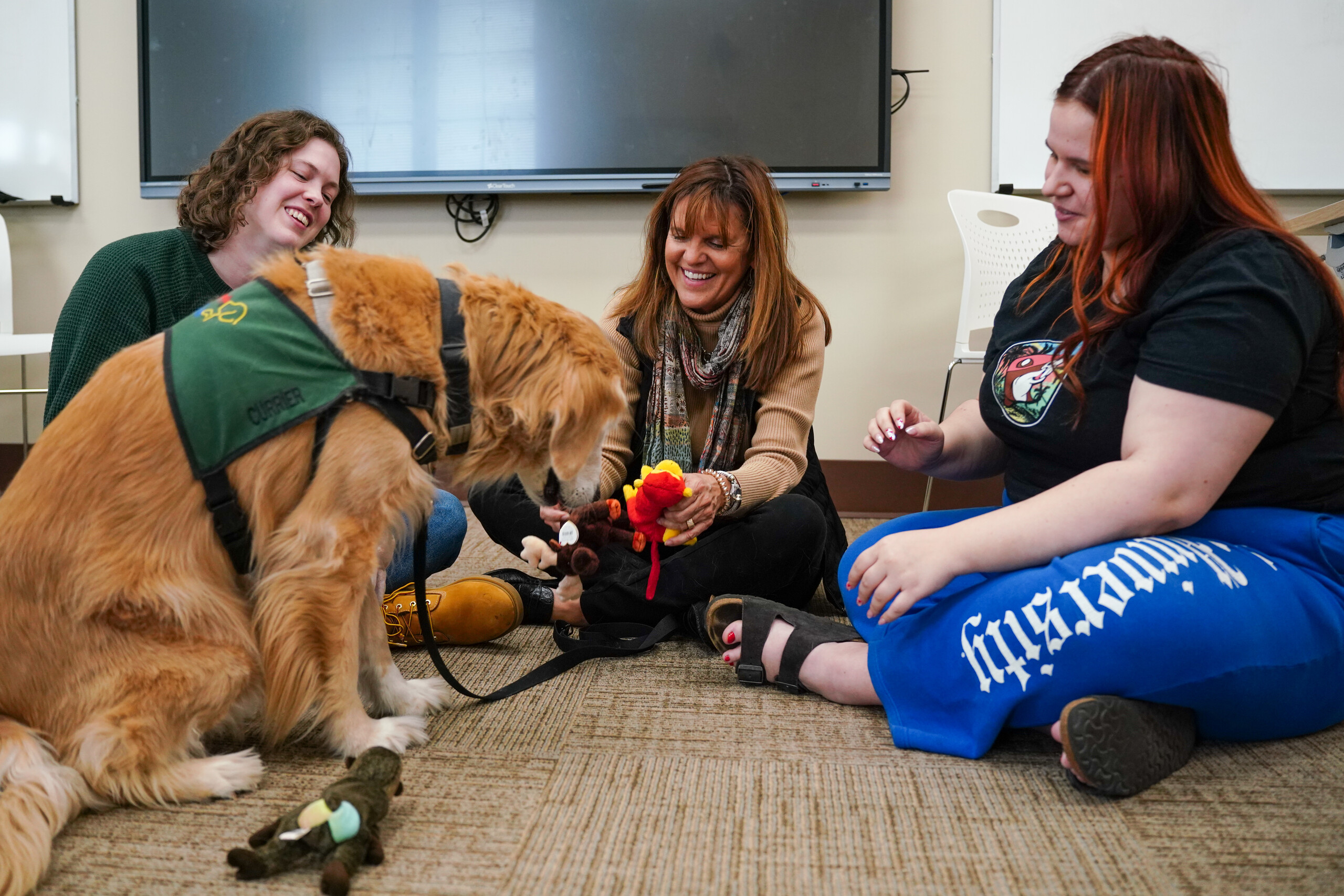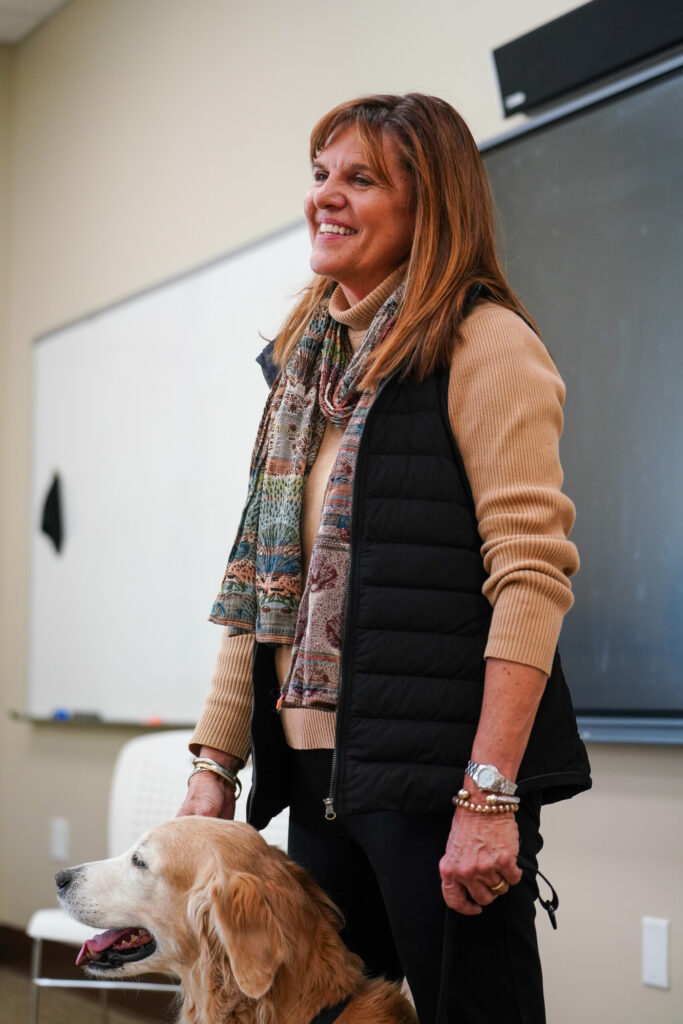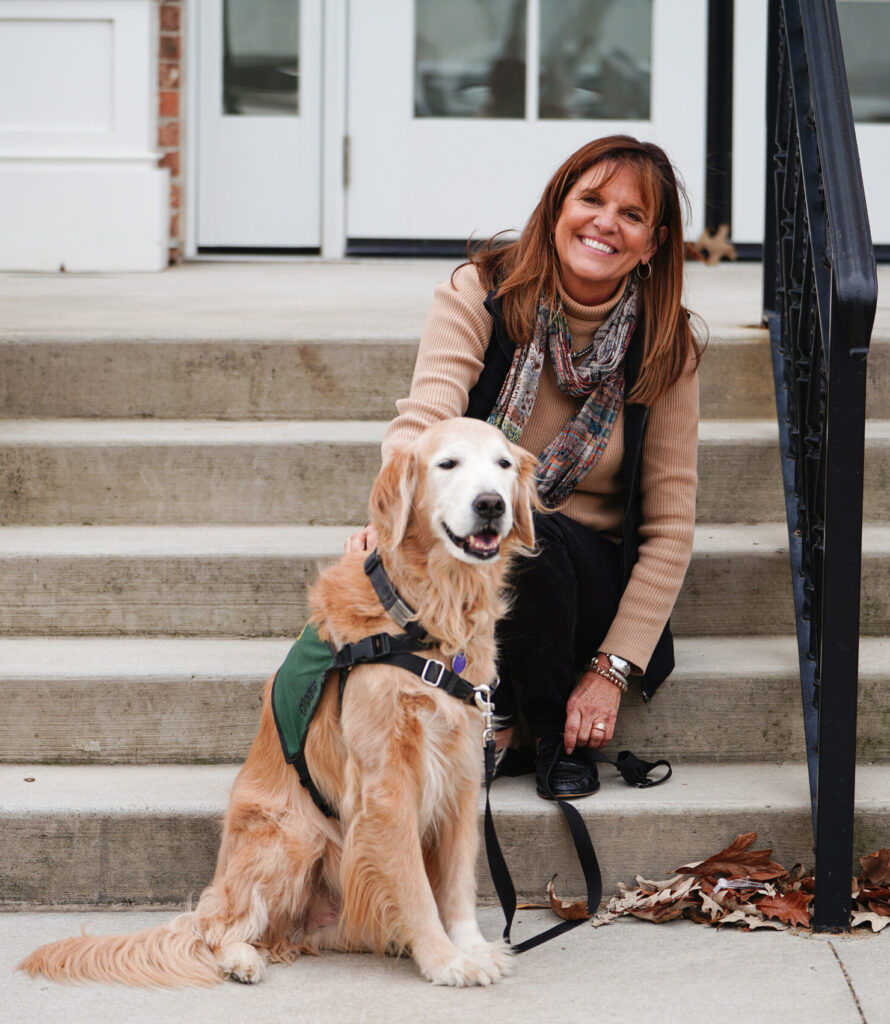
Lucinda Grapenthin, Ph.D., begins her Monday afternoon class on adjunctive therapies with a rapt audience as her facility dog, CURRIER, models many of his more than 100 commands. The students are learning about adding supplemental tools to technique, and the fluffy golden retriever is easily a favorite tool.
Grapenthin and CURRIER became a working team in 2020 through paws4people®, a North Carolina-based non-profit that specializes in psychiatric service animal training and distribution. CURRIER underwent extensive training until he was 2 years old, and was then matched with Grapenthin. She also underwent rigorous training to become his handler and is required to recertify her training each year.
Grapenthin, an associate professor in the Lynn J. Darby School of Psychology and Adolescent Counseling at Brenau University, specializes in play therapy. The technique is used for children and older clients with mental health issues and provides structure and boundaries without being daunting or creating further anxiety. Grapenthin is director of the Brenau University Play Therapy Training Institute, and at the Brenau Center for Counseling & Psychological Services at the Norcross campus. She also has her own practice, The Family & Child Development Center in Alpharetta, and has written an award-winning children’s book, “Toby, Toby, Worry Free.”
“Much like play therapy, having a facility dog in the session helps the patient redirect their focus, and for a lot of people, just having him in the session or classroom helps them relax and feel less stressed,” Grapenthin says. “CURRIER loves to be brushed and play with bubbles, so I encourage them to play or groom him as a way to build trust with the dog, but also to relax and center themselves.”

paws4people
paws4people is a non-profit organization that provides highly trained, customized, and insured assistance dogs to people with disabilities. Based in Wilmington, North Carolina, paws4people specializes in psychiatric service dogs for both civilians and veterans.
CURRIER is an Honor Litter puppy, named after Pfc. Eric Currier, a Marine who was killed in action while supporting combat operations in Afghanistan.
To differentiate between the two, the Honor Litter puppies’ names are written in all-caps.
Connection over correction
“If you have a positive relationship, your clients – children especially – are more apt to follow directions and suggestions. They’re more open to being taught things,” Grapenthin says. “Clients come with diverse needs such as feelings of anxiety, rejection and low self-esteem. Having CURRIER’s calm presence assists with mediating those feelings.”

Grapenthin’s tried-and-true method for working with children on their mental health is connection over correction.
“He’s an incredible tool for talking about emotions, or co-regulation. Sometimes the child will speak with CURRIER instead of me, or I will ask them what CURRIER might be feeling in certain situations to help them identify emotions,” Grapenthin says. “Or we can speak through CURRIER to help talk through the tougher stuff.”
For Grapenthin’s students, CURRIER is just one model of adjunctive therapies. Other adjunctive therapies include dance and movement – another certification Brenau offers – or art therapy.
CURRIER can help students reduce stress and learn to manage their emotions before going into the psychology field. Eli Coker, a master’s degree student who has had several classes that feature CURRIER, says having a dog in class helps her and her fellow students while they learn how to handle tough topics.
“He offers comfort to us when we discuss the heavier stuff, like sexual abuse, and how to navigate it with out future clients,” Coker says.
Coker, who is getting certifications in both play therapy and dance movement therapy, says adjunctive therapies can be a key tool in getting clients of any age comfortable in a session, and emphasize the power of connection.
“For a child, it may be hard to connect with an adult, so CURRIER can be that connection point,” Coker says. “It also expands our understanding on the purpose of therapy as students. You go in thinking about the intricate skills and technique needed, but the connection of having another being with you shows how your presence can help a client.”
Using your tools
As an adjunctive therapeutic tool, Grapenthin says she can use CURRIER to model the effectiveness of positive reinforcement.
“Research shows positive reinforcement is far more powerful than negative reinforcement for both children and their parents,” Grapenthin says. “It’s so important to build a relationship and trust before modifying behaviors.”
Another tool, physical touch, can be limited to necessity in healthcare; some mental health practices do not allow it. But research shows that touch can be also a powerful tool, as it triggers the release of oxytocin, a natural hormone useful for trust-building, including parent-infant bonding.
“Some clients, especially children, who have negative experiences with touch may even be afraid to be touched,” Grapenthin says. “So having a facility dog creates a way to allow touch and increase the oxytocin production with patients without the counselor touching them directly.”
CURRIER can support kids who are violent or aggressive in their mannerisms, too. Grapenthin says she can use CURRIER to more easily explain gentle touch and how touch impacts others.
CURRIER is also a useful tool for modeling calmness. One of his many tricks is knowing how to walk on his hind legs while kids hold his paws, something Grapenthin says helps them regulate and learn self-control. In the process, he also models positive behaviors for parents, including tone of voice.

What’s in a name?
Service animals are dogs or miniature horses trained for specific tasks to assist their handlers. This includes mobility assistance, sensory and tactile pressure, and medical alerts. When in public, they are working and should not be pet, fed or distracted.
Facility dogs, like CURRIER, specialize in therapeutic tasks and work in a medical setting. They operate more like employees, are highly trained, and some live at their work locations. When they retire, they become pets.
Therapy animals are pets trained in emotional or therapeutic care and can be a variety of species, including cats, rabbits and reptiles.
Service animals, therapy animals and facility dogs are all legally protected under the Americans with Disabilities Act. That means they are freely allowed in public spaces.
More information about service animals can be found at www.ADA.gov

